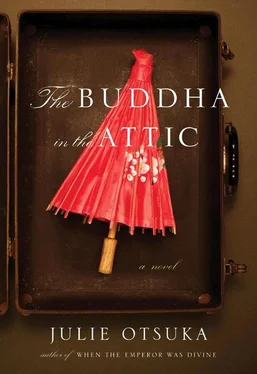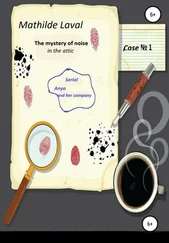The Japanese have disappeared from our town. Their houses are boarded up and empty now. Their mailboxes have begun to overflow. Unclaimed newspapers litter their sagging front porches and gardens. Abandoned cars sit in their driveways. Thick knotty weeds are sprouting up through their lawns. In their backyards the tulips are wilting. Stray cats wander. Last loads of laundry still cling to the line. In one of their kitchens—Emi Saito’s—a black telephone rings and rings.
DOWNTOWN, on Main Street, their dry cleaners are still shuttered. For Lease signs hang in their windows. Unpaid bills and business receipts drift by in the breeze. Murata Florist is now Flowers by Kay. The Yamato Hotel has become the Paradise. Fuji Restaurant will be reopening under new management by the end of the week. Mikado Pool Hall is closed. Imanashi Transfer is closed. Harada Grocery is closed, and in its front window hangs a handwritten sign none of us can remember having seen there before— God be with you until we meet again , it reads. And of course, we cannot help but wonder: Who put up the sign? Was it one of them? Or one of us? And if it was one of us, which one of us was it? We ask ourselves this as we press our foreheads to the glass and squint into the darkness, half expecting Mr. Harada himself to come barreling out from behind the counter in his faded green apron, urging upon us a stalk of asparagus, a perfect strawberry, a sprig of fresh mint, but there is nothing there to be seen. The shelves are empty. The floors, neatly swept. The Japanese are gone.
OUR MAYOR has assured us there is no need for alarm. “The Japanese are in a safe place,” he is quoted as saying in this morning’s Star Tribune . He is not at liberty, however, to reveal where that place is. “They wouldn’t be safe now, would they, if I told you where they were.” But what place could be safer, some of us ask, than right here, in our own town?
THEORIES, of course, abound. Perhaps the Japanese were sent out to the sugar beet country—Montana or the Dakotas, where the farmers will need help badly with their crops this summer and fall. Or perhaps they’ve assumed new Chinese identities in a faraway city where nobody knows who they are. Perhaps they’re in jail. “My honest opinion?” says a retired Navy corpsman. “I think they’re out there on the ocean, zigzagging past the torpedoes. They’ve all been shipped back to Japan for the duration of the war.” A science teacher at the local high school says she lies awake every night fearing the worst: they’ve been herded into cattle cars and they’re not coming back, or they’re on a bus with no windows and that bus is not stopping, not tomorrow, not next week, not ever, or they’re marching single file across a long wooden bridge and when they get to the other side of that bridge they’ll be gone. “I’ll be thinking these things,” she says, “and then I’ll remember—they already are gone.”
YOU CAN STILL SEE the official notices nailed to the telephone poles on the street corners downtown, but already they are beginning to tatter and fade, and after last week’s heavy spring rains only the large black letters on top— Instructions to All Persons of Japanese Ancestry —are still legible. But what it was, exactly, that these instructions spelled out, none of us can clearly recall. One man vaguely remembers a no-pets directive, as well as a designated point of departure. “I think it was the YMCA on West Fifth Street,” he says. But he’s not sure. A waitress at the Blue Ribbon Diner says she made several attempts to read the notice the morning it was posted but found it impossible to get up close. “All the telephone poles were surrounded by little clusters of concerned Japanese,” she tells us. What struck her was how quiet everyone was. How calm. Some of the Japanese, she says, were slowly nodding their heads. Others took notes. None of them said a word. Many of us admit that although we passed by the notices every day on our way into town, it never occurred to us to stop and read one. “They weren’t for us,” we say. Or, “I was always in a rush.” Or, “I couldn’t make out a thing because the writing was just so small.”
IT IS OUR CHILDREN who seem to have taken the disappearance of the Japanese most to heart. They talk back to us more than usual. They refuse to do their homework. They are anxious. They fuss. At night formerly brave sleepers are now afraid to turn off the light. “Every time I close my eyes I can see them,” one child says. Another has questions. Where can he go to find them? Is there school where they are? And what should he do with Lester Nakano’s sweater? “Keep it or throw it away?” Over at Lincoln Elementary an entire class of second graders has become convinced that their Japanese schoolmates have gotten lost in the forest. “They’re eating acorns and leaves and one of them forgot her jacket and she’s cold,” one girl says. “She’s shivering and crying. Or maybe she’s dead.” “She’s dead,” says the boy beside her. Their teacher says that the hardest part of her day now is taking roll. She points out the three empty desks: Oscar Tajima, Alice Okamoto, and her favorite, Delores Niwa. “So shy .” Every morning she calls out their names, but of course, they never answer. “So I keep marking them absent. What else am I supposed to do?” “It’s a shame,” says the school crossing guard. “They were good kids. I’ll miss them.”
THERE ARE CERTAIN MEMBERS of our community, however, who were more than a little relieved to see the Japanese go. For we have read the stories in the papers, we have heard the whispered rumors, we know that secret caches of weapons were discovered in the cellars of Japanese farmers in towns not far from ours, and even though we would like to believe that most, if not all, of the Japanese here in our own town were good, trustworthy citizens, of their absolute loyalty we could not be sure. “There was just so much about them we didn’t know,” says one mother of five. “It made me uneasy. I always felt like there was something they were trying to hide.” When asked if he had felt safe living across the street from the Miyamotos, a worker at the ice factory replies, “Not really.” He and his wife were always very careful around the Japanese, he explains, because “we just weren’t sure. There were good ones and bad ones, I guess. I got them all mixed up.” But most of us find it difficult to believe that our former neighbors could have posed a threat to our town. A woman who used to rent to the Nakamuras says they were the best tenants she’s ever had. “Friendly. Polite. And so clean, you could practically eat off their floors.” “And they lived American, too,” says her husband. “Not a Japanese touch anywhere. Not even a vase.”
WE BEGIN TO RECEIVE reports of lights left on in some of the Japanese houses, and animals in distress. A listless canary glimpsed through the Fujimotos’ front window. Dying koi in a pond over at the Yamaguchis’. And everywhere, the dogs. We offer them bowls of water, pieces of bread, leftover scraps from our tables, the butcher sends over a fresh cut of filet mignon. The Koyamas’ dog sniffs politely and then turns away. The Uedas’ dog bolts past us and before we can stop her she’s out the front gate. The Nakanishis’ dog—a Scottish terrier that is a dead ringer for the President’s little black dog, Fala—bares his teeth and won’t let us anywhere near. But the rest come running out to greet us, as though they have always known us, and then follow us home, and within days we have found them new owners. One family says they would be more than happy to adopt a Japanese dog. Another asks if there are any collies. The wife of a young soldier who was just called up for duty takes home the Maruyamas’ black-and-tan beagle, Duke, who follows her from room to room and won’t let her out of his sight. “He’s my protector now,” she says. “We get along just fine.” Sometimes, though, in the middle of the night, she can hear him whimpering in his sleep and she wonders if he is dreaming of them.
Читать дальше












